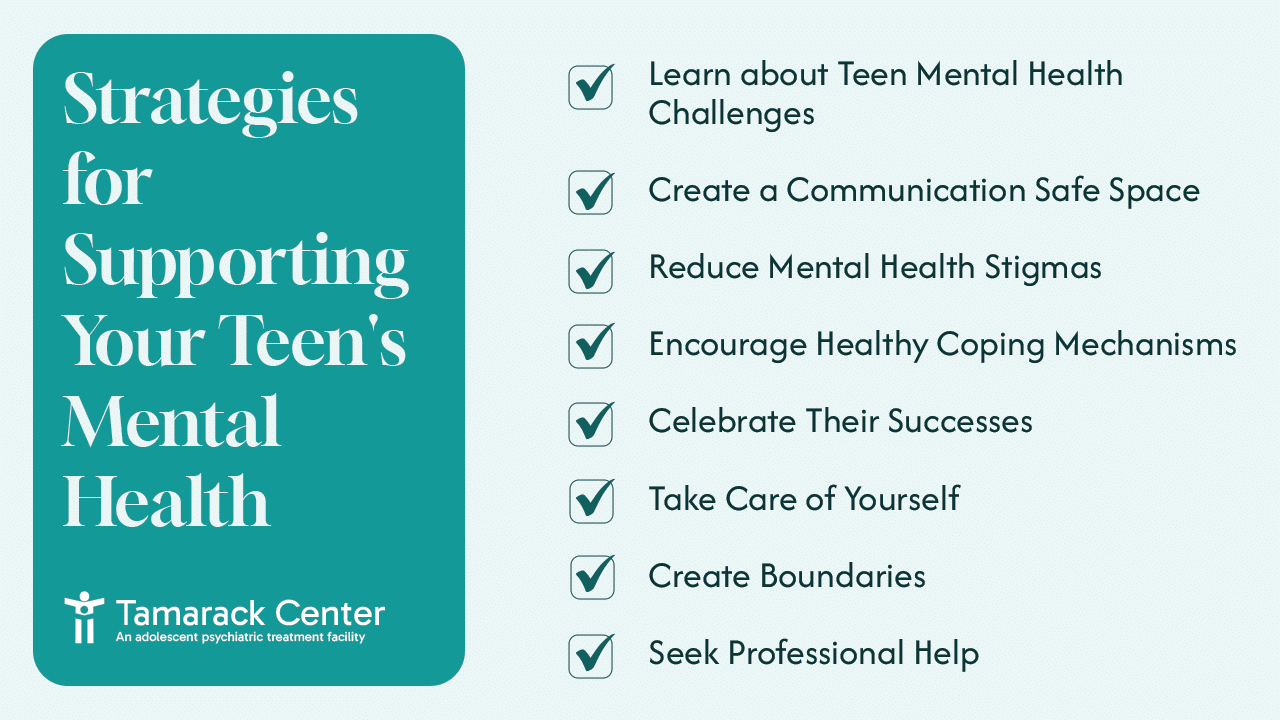Do you know how to support your teen when they struggle with mental health issues? Or how to support them on their journey?
The answer for many is, “No.”
That’s not surprising. There isn’t a standard set of steps for supporting teen mental health. Every teen is different and every mental health journey is different.
Instead of looking for specific actions, try developing strategies that improve communication, provide safety, build trust, and help your teen improve their coping skills.
NOTE: If you ever believe your teen is in imminent danger of self-harm, immediately call 911 or contact the National Suicide Prevention Lifeline by dialing 988.
Here are several strategies for supporting your teen’s mental health, including some specific details for how you can implement them.
If your teen is experiencing a mental health crisis, we can help. Contact Tamarack Center to find out more.

Strategies for Supporting Your Teen’s Mental Health
Learn about Teen Mental Health Challenges
One of the best things you can do is learn more about the mental health challenges common in teens. Some conditions, like anxiety and depression, are common in both teens and adults. Other issues, such as eating disorders, are more common among teens.
But for teens, addressing these challenges can be different. They have less life experience and may not understand the mental health condition they’re experiencing. It might have a bigger impact since they don’t know how common these challenges can be, making them feel abnormal, isolated, and alone.
Learning more about the mental health concerns that teens deal with and how they can affect teens differently from adults can help you be a trusted, supportive resource for them.
Create a Communication Safe Space
Providing a safe space for open, honest communication is critical. A teen experiencing mental health challenges may feel like something is wrong with them, that they’re “broken” somehow, and become detached from their peers. By creating a communication safe space, where they can discuss what they’re experiencing without fear of judgment, you provide an invaluable place of support.
Start by letting your teen know you’re there for them, and ready to listen without judgment anytime they want or need. Encourage them to talk about what they’re going through, their thoughts, worries, and feelings.
Listen to what they’re saying, verbally and non-verbally. Body language and context often say a lot more than words.
Validate their feelings by saying things like, “It sounds like you’re feeling…” or “That must be really painful/difficult/frustrating,” etc. This will let them know they’re being seen, heard, and understood.
Show your empathy by saying things like, “I’m sorry you’re going through this,” And let them know it’s perfectly normal to feel however they’re feeling.
When expressing concern, it helps to use “I” statements such as, “I get worried when you…” as opposed to broader judgmental statements such as, “You really shouldn’t…”
Being someone your teen can openly talk with about anything (without being judged) goes a long way toward supporting their mental health journey.
Reduce Mental Health Stigmas
Societal stigmas around mental health challenges have lessened over time, but they haven’t gone away. Stigmas can be particularly bad among teens encountering mental health disorders in themselves or others for the first time.
You can reduce the impact of stigmas by talking openly about mental health within your family. Discuss the benefits of treatment and any experience with therapy other family members have had. This will help your teen understand that mental health challenges are common, treatable, and affect almost everyone at some time in their lives.
Encourage Healthy Coping Mechanisms
You can provide tangible support by helping your teen find healthy coping mechanisms to manage difficult thoughts and emotions.
Encourage them to engage in physical exercise or activities. See if they’d like to join you on a hike, play basketball, pickleball, or other activities. Mental and physical health are often related and reciprocal.
Or join them in a video game. Many video games promote exercise and exploration, not just sitting and holding a controller. Dance games, competitive sports games, and many VR games promote a surprising amount of physical activity.
You can offer to teach them relaxation techniques or learn a few with them. Many mindfulness apps and online videos teach guided relaxation.
In addition, try encouraging your teen to start a journal, where they express their thoughts and emotions privately.
Writing down thoughts and emotions makes them more external and easier to evaluate. There are thousands of videos online about various approaches to journaling. They can write in a notebook, journal in a favorite app, or use a speech-to-text app. Handwritten journals offer a bit more benefit because they take longer to write, which can help clarify thoughts. But all journaling has benefits, regardless of the medium. Be sure to emphasize that their journal is completely private and for their eyes only.
Many teens may also find artistic activities to be helpful coping mechanisms. Digital art, collage art, painting, sculpture, music, theater, and creative writing can all be healthy coping mechanisms and an outlet for self-expression. Make sure they know it isn’t about becoming good at whatever they choose. It’s simply about enjoying the activity regardless of their skill level.
Celebrate Their Successes
Mental health challenges have a way of changing the way we see and interpret almost everything. We can forget our accomplishments or neglect the things we usually find enjoyable.
Take note of even the smallest success your teen experiences. If they tried a new coping mechanism, shared more than they usually do, socialized a bit more, or took on a task they found difficult to perform while struggling with their mental health – notice and confirm all of these.
And celebrate them! Let your teen know you recognize their efforts — and that you’re proud of them regardless of the outcome.
Take Care of Yourself
Taking care of someone dealing with mental health issues is hard. It’s even harder when dealing with poor mental health yourself.
When supporting your teen, don’t forget your own mental health needs. Find time for relaxation, take time for activities you enjoy, and try to get enough sleep and eat healthily. You may also try some of the coping mechanisms mentioned above.
And consider seeking mental health services for yourself! Taking good care of yourself makes you much more capable of supporting your teen.
As the old saying goes, “You can’t pour from an empty cup.”
Create Boundaries
It’s important to set some boundaries when supporting your teen’s mental health. Be honest about your available time. If you don’t have time to help your teen at a specific moment, give them a specific time when you will be available. If you’re not available for emotional support at a particular moment, find someone who can be.
Develop a support network of people that you trust and can call on when you or your teen need help.
Seek Professional Help
Mental health experts are trained in treatment methods for various conditions.
Sometimes the best support you can give someone with a mental health disorder is connecting them with a professional. They can offer a level of mental health support beyond the skills of most parents.
Mental health care providers can be beneficial at any time. But if you’re not sure if your teen needs professional help, contact your mental health provider for a consultation and evaluation. They can provide you with insights to help you decide.
Tamarack Center – Supporting Youth Mental Health
Tamarack Center provides effective, compassionate treatment for your child’s mental health. We provide a safe environment, structured daily schedules, and recreational activities. Our staff includes a full-time child psychiatrist, pediatrician, clinical psychologist, Master’s level therapists, and a Master’s level teacher who provides for the residents’ education during their stay.
We use evidence-based, effective treatment modalities for mental health conditions, such as Dialectical behavior therapy (DBT) and medication management when required.
Families are key members of our treatment team. You know your child better than anyone. Your insights and experiences play an important part in every treatment plan.
If your teen is experiencing a mental health crisis, we can help.
We offer mental health services for struggling teens. Contact Tamarack Center and see how we can help.

